Any collectible automobile can be a hole to throw money down. However, some vehicles carry us beyond the breaking point. Take this 1978 Corvette for sale on Craigslist in lovely Lecanto, Florida. After spending copious amounts of time and money, the previous owner unloaded this light blue beauty on the current owner. Much to the new owner’s surprise, the engine let go on the drive home. Current needs have overridden the desire to order a crate motor and fix this otherwise nice Corvette. Is the current owner’s frustration a chance to pick up a Corvette in an unusual color on the cheap? Is it even worth the hassle for an asking price of $9,500? Thanks to Rocco B. for the tip!
Owning a Corvette over a Porsche or some other similar foreign sports car can be a mixed blessing when it comes to parts. While Porsche owners can count on high parts prices and bake that into the equation when considering a purchase, Corvette owners suffer a different experience. Many Corvette parts were used on lesser General Motors products and can be had relatively inexpensively. Corvette-specific parts are a totally different story. If it is reproduced by one of the long-standing Corvette aftermarket parts houses, you can count on it being expensive. Also, don’t expect these parts houses to compete with each other. There seems to be a gentleman’s agreement that they will sell these reproduction parts to each other and strive to make the price for the part the same no matter which business you choose. Corvette fan items such as T-shirts, jackets, and floor mats don’t follow this pattern. They are all still very much the Wild West in price, quality, and ethics.
Another problem for Corvette owners is originality. If you are looking at a Corvette for an investment, then the numbers have to match. This is more of a problem for earlier model years. However, it is a consideration for anyone looking at Corvettes built from 1953 through 1982. What if you damage your engine block to the point it cannot be repaired? In the olden days, unscrupulous owners and dealers just tampered with the number stamped on the block to make it match. Many a Corvette “investor” has been duped by this stunt. So, what does one do in this situation? You make lemonade out of lemons.
Once you are out of the collectability game, be it with or without a choice in the matter, the best thing you can do is enjoy the awesomeness that is a Small Block V-8. Corvettes since 1955 (except for a relative handful of Big Block-equipped cars) have been equipped with various versions of this most adaptable and well-developed engine on the planet. You can open a new tab on your computer right now, go to a speed shop website, break out your well-used credit card, and have a 600+ horsepower engine sitting on your doorstep in 3-5 business days. Once you get over some year-specific fitment hurtles, you can be off and running in a few days with a minimum of mechanical skills.
This is where the current owner of this 1978 Corvette is. The story in the ad, which can be a bit hard to interpret, is that this car was purchased from someone who spent a lot of money going through this Corvette to get it as right as possible without going through the expense and trouble of a full restoration. The picture below is a list of what was replaced. There is probably a second or third page of that list as well. It is a testament to just how much of a money pit an older car can be. Whoever this person is, they threw in the towel for whatever reason. Probably had to make the hard choice between eating and Corvette ownership. Anyway, the car went up for sale and the current owner plunked down the cash and attempted to blissfully drive it home. The assumption the reader makes is that the car was some distance away.
The car didn’t make it to its destination under its own power. Something inside the engine let go and it ended up being unceremoniously shipped home. The seller tells us that the car will start and run, but the hammering noise is still there singing the song of its people. It may be as simple as a bent or broken valve, or it may be far worse. Who knows? What we do know is that the seller had a good idea before they threw in the towel and put this Corvette on Craigslist. Ordering a crate engine was in the works, but life had other plans. Sometimes you just have to move on.
So, what we have is a later third-generation Corvette in a fairly rare light blue color that has benefitted from a lot of parts and labor. The body has a little over 80,000 miles on it and is perfectly presentable and useable if the engine were replaced. The air conditioning system works as it sits, but the heater core has been bypassed. It even has a working 8-track player just in case you still have some Tito Puente tapes sitting around unappreciated. You would have to give up on the whole matching number thing if the block has damage, but does that really matter in a 1978 Corvette? If you want a driver, then this may be a good deal when you consider how much has been replaced so far.
What do you think? Do matching numbers really matter in this case? Is this a good project to take on for $9,500? If not, what would a fair offer be? Please share your thoughts in the comments.
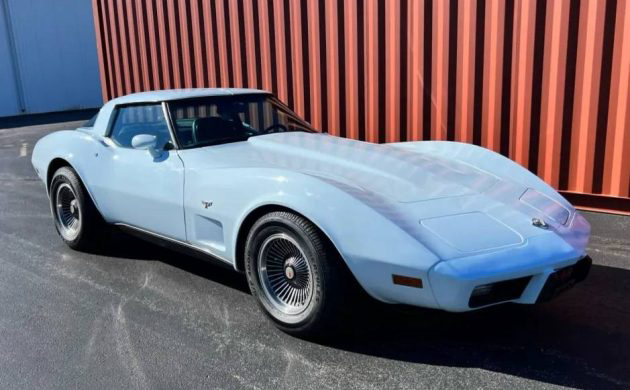
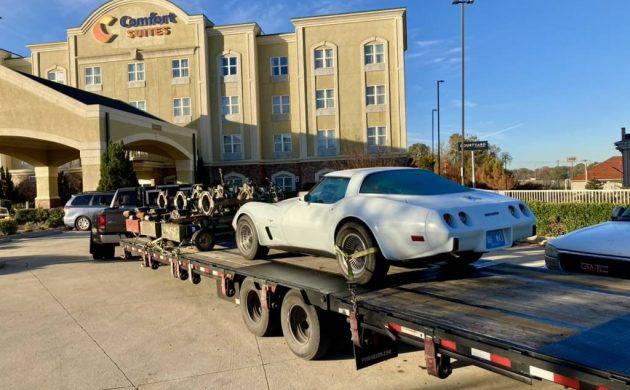
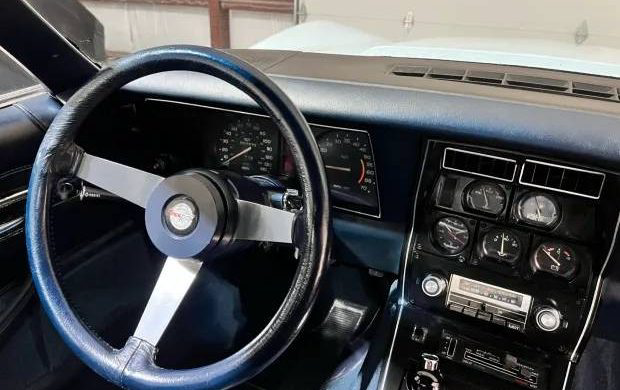
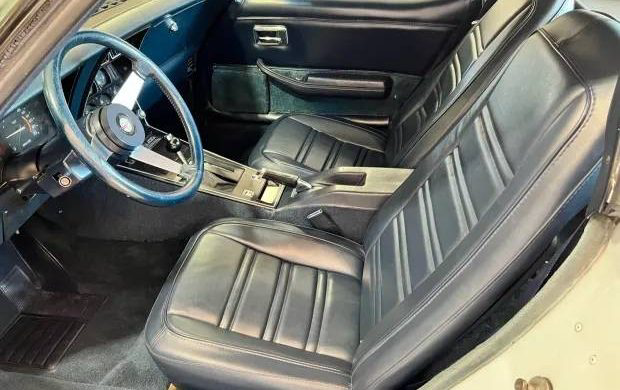
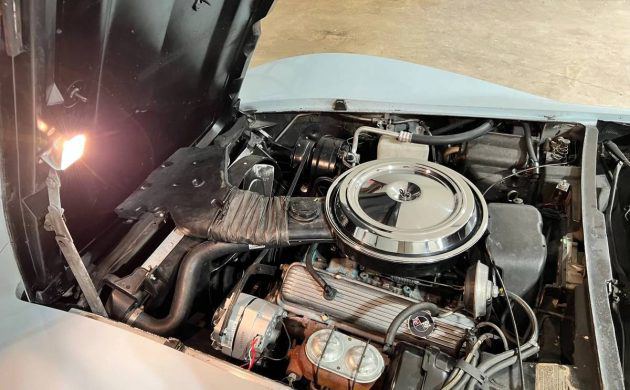





They made 1,960 ’78 Corvettes in Light Blue. I think the ’82 wheels look okay, but would like the ’78 Aluminum versions better.
I would play ’20 questions’ to try and determine the root cause of the engine problems (bearing failure? lost coolant?) They are definitely needed to determine what price should be offered.
Ad was updated, ran out of oil after 500 miles. Very sad indeed. Who checks oil after a couple tanks of gas?? Even I don’t driving a 200k mile Dakota.
Wonder what previous owner had done prior to sale.
Cars in this condition are on the market for anywhere from $15K to $30K. That is, with an engine that works. Summit will sell you a long block for around $3300 with shipping. Add in another $2000 or so for installation help and incidentals and you’re right in the ballpark.
This is, of course, pure conjecture on my part, but it does make the prospect intriguing. Consulting with someone who actually knows what he’s talking about is advised. Might also be a good idea to line up a qualified technician to assist/do the work. Given the obviously necessary outlay of cash to fix it should give a potential buyer some leverage on the price.
The pluses here are C3s are distinctive enough that: 1) people will notice you and 2) an upgrade to 330+hp will address a C3’s greatest shortcoming.
Boy oh boy, what a shame! Due diligence and as noted, a LOT of discussion might result in a fair deal for both sides. Good luck to seller and buyer.
I purchased my 74′ C3 in White for 9K with a 383 stroker already installed and running good. I think $9500 for a possible “roller” is too high.
The first ‘Vette I’ve seen in that light blue color. Can’t say I care for it either. I WOULD DEFINITely repaint it
You should probably find a car in the colour that you prefer. Have you priced out a half decent two stage paint job lately?
The way it sits……..$3500.
$5-6000 would be fair…but first the engine should be torn down to discover the problem
Back in the 80’s I had 327 make such a noise I gave up on it and gave it away to a gearhead I knew he diagnosed the noise to the camshaft driven rod that operated the fuel pump.
I am sure the seller knows this engine is fried, finding a good mechanic to tell you that your screwed is not that tough. That bring said, the color is not the greatest, and you have to ship it. A 1978 Corvette is not that valuable to begin with, this is a buyer’s market car. Make an offer about one half of what they are asking, the seller just wants out.
Too much money. I recently gave 2/3 that for an 82 collector edition with a great running engine. I need a few things and mine will be perfect.$3500 is about right for a non runner.
$9500 for an example with a bad motor seems a tad high. Maybe offer $6k and see if he bites. As for the condition of the motor, it could be a relatively cheap fix (bent pushrod, stuck valve), or fatal (Cracked block). Without tearing the engine down, it’s hard to tell. I’d start with either a compression test or a cylinder leak down test, both dry and wet, maybe bore scoping the cylinders before pulling the engine from the car. If you can diagnose the problem with the engine still in the car, you may be able to repair it without removing the motor from the car, but evidence of water in the oil or low compression almost certainly means a complete overhaul. Pulling the engine isn’t conceptually hard, but you need a garage to work in, and renting an engine crane is a given. I certainly wouldn’t try to do the job without help, so drafting one or more friends and/or relatives is highly recommended. Don’t forget to thank them with food, and more importantly, BEER!
Once the engine is out of the car and disassembled, you can determine next steps. Depending on the damage, a trip to a local machine shop is in your future. There the machinist will magna flux the block and heads, looking for cracks. If no cracks are found, the the machinist will recommend the services you need, including boring out the block and/or replacing the valves, valve guides, valve seats valve seals and valve springs. Boring the block means new pistons and connecting rods with new bearings. The machinist will also inspect and magna flux the crank, to check for cracks. Again, a cracked crank must be replaced, but a sound crank can be machined and balanced, then new main bearings will be installed.
Do all of this, reassemble the engine and reinstall it in the car, and your numbers matching engine is as good, and possibly better than new! Cost varies on the amount of work done and how much you can do yourself instead of hiring a pro to do the work, so tread carefully and be brutally honest about your mechanical abilities, because putting the engine back together incorrectly can destroy an engine in short order (don’t ask me how I know this, LOL)! If keeping the numbers matching engine is important to you, then this is your only option. If that is not important to you, then a crate motor may be a better option, especially if you’re thinking of a restomod anyway. A crate motor may or may not be cheaper than rebuilding the stock motor, but it will be faster, since the engine arrives fully assembled and tested, with a full factory warranty.
I have a 1977 matching number Vette and it is a driver. No rust – no issues.
I’d be interested in this Vette – with a like new engine – numbers don’t matter to me and I’d drive it and store the one I have for sale in the future. The engine doesn’t care if the numbers match. Either it runs or it doesn’t.
Depends what you want the car for – just to look at or enjoy driving?
I recommend checking oil after each Fill up after buying an older car. My daughter blew up her mid-90’s Chevy pickup. I told her check the oil every fill up until they knew how much it uses, her and her “mechanic” boyfriend couldn’t be bothered to do that. Within a month they ran the motor out of oil and locked it up.
Ignition shielding still necessary in ’78 even with HEI & resistor spark plugs?
Or does that just keep water away – from rain & when washing the car?
A fine steering wheel upgrade for an older vette.
Ck that oil pressure sender to see if was leaking – or loose.
Why is everyone looking to rebuild the original engine, 450 HP 383 stroker isn’t that expensive and would make driving so much more enjoyable. But only if the price was down to 6500 then it’s doable. Is number matching all that important on a late C3?
No
Exactly right on. I’ve always considered the later C3 as a blank canvas, the motor the came in this one when new needed replaced when it was running perfectly. Who gives a rats ____ what happened to it.